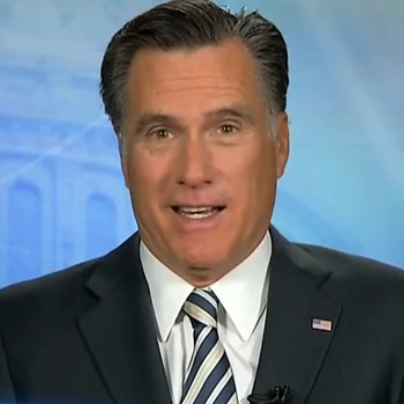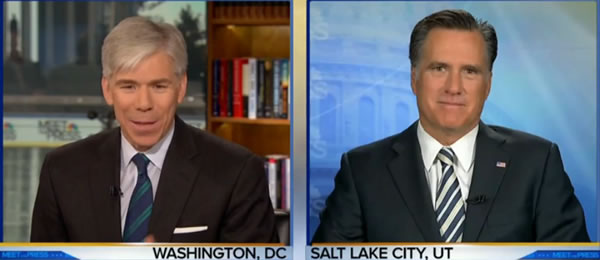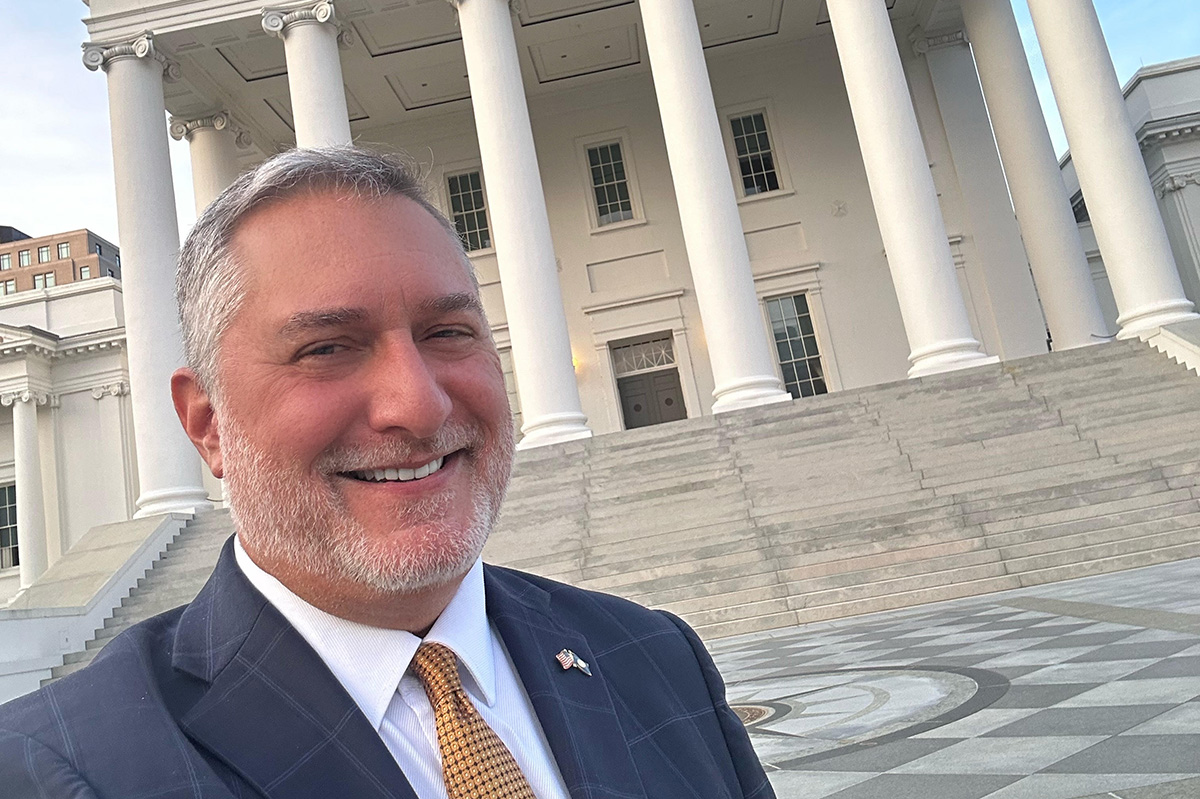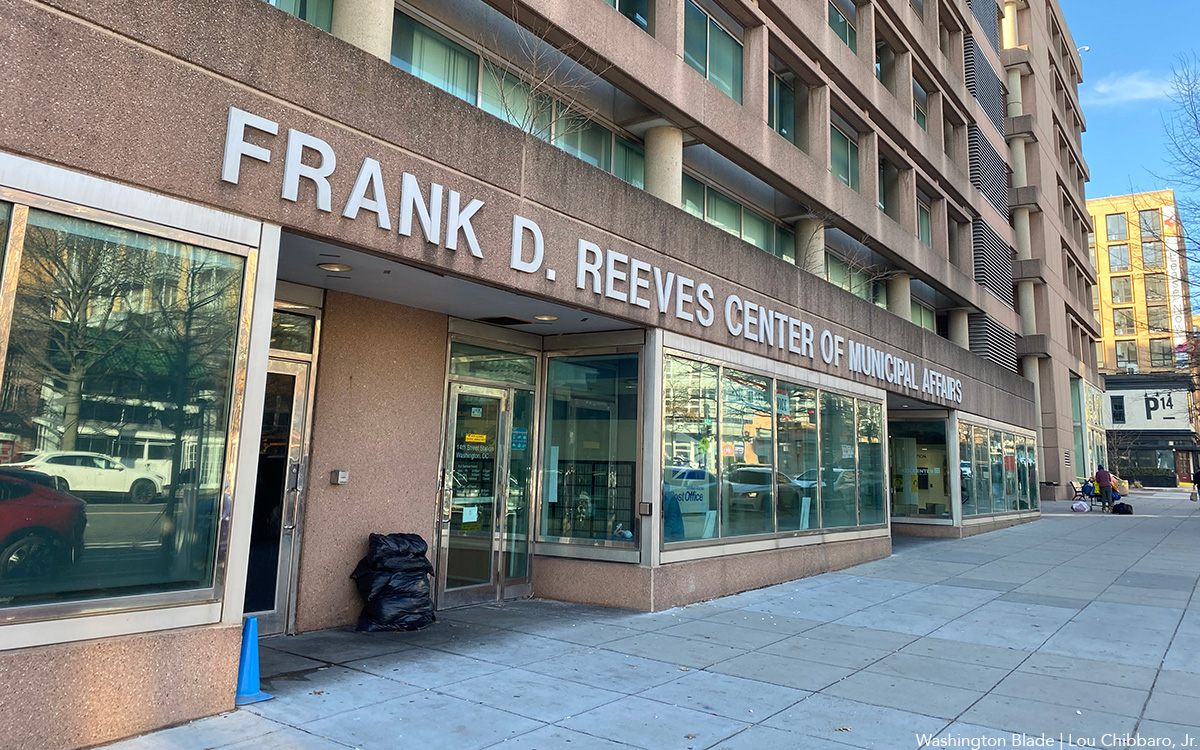News
Romney needs time to determine impact of marriage equality
Former GOP presidential contender says it could take ‘generations’


Mitt Romney said on “Meet the Press” it could take “generations” to determine the impact of marriage equality. (Screenshot via NBC News).
Former Republican presidential nominee Mitt Romney reiterated his opposition to marriage equality on Sunday, saying it will “take a long, long time” to determine whether the advancement of same-sex marriage will have an impact the way children are raised.
Romney, who lost the election to President Obama in 2012, when asked by host David Gregory on NBC’s “Meet the Press” in an appearance to discuss the 2014 Winter Olympics whether the legalization of same-sex marriage throughout the country has had a negative impact on society.
Gregory pointed to a 2004 op-ed that Romney wrote for the Wall Street Journal in opposition to same-sex marriage, titled, “A Citizen’s Guide to Protecting Marriage.” Romney wrote it nearly ten years ago while governor of Massachusetts after the State Supreme Court legalized marriage equality, making the Bay State the first in the country to afford marriage rights to gay couples.
At first, Romney dodged in his response to Gregory’s question on whether he has found negative impact of same-sex marriage since that time, reiterating his previously stated talking points that he believes marriage should be limited to one man, one woman.
“Well, I think marriage is a relationship between a man and a woman, and I think the ideal setting for raising a child is in a setting where there’s a father and a mother,” Romney said. “Now there are many other different settings that children are raised in, and people have the right to live their life as they want to, but I think marriage should be defined in the way that it has been defined for several thousand years, and if gay couples want to live together, why that’s fine as well. That’s their right.”
But when Gregory pressed Romney to evaluate whether marriage equality has had a negative impact, the former Massachusetts governor said it’s too soon to tell and it may take “generations” before the consequences are known.
“I think it’s going to take a long, long time to determine whether having a gay marriage make it less likely for kids to be raised in settings where there’s a mom and a dad,” Romney said. “That’s not going to happen overnight. It’s something which happens over generations, in fact. Again, I think the ideal setting is whether there’s a mom and a dad that can invest their time and their resources in supporting the development of a child.”
Despite Ronmey’s concerns, major psychological and family groups have disputed the notion that gay parents aren’t as fit as straight parents in raising children. Last year, the American Academy of Pediatrics came out in support of same-sex marriage.
Romney also refused under further questioning to characterize the issue of same-sex marriage as an Republicans have lost, saying it’s playing out across the country.
“I think, in this case, it continues to be an issue that people find relevant and important, and it’s something which is being considered in various states across the country,” Romney said.
Following numerous court rulings in favor of marriage equality and expectations the issue once again reach the U.S. Supreme Court, the former Republican presidential contender added he believes the issue of marriage equality should be decided by the people, not judges.
“I do believe, by the way, that it’s best decided by the people, rather than by the courts,” Romney said. “I think when the courts step in and make a decision of this nature, they’re removing from the people something which they have the right to decide themselves.”
In 2012, Romney campaigned not only in opposition to same-sex marriage, but signed a pledge with the anti-gay National Organization for Marriage to support a U.S. constitutional amendment that would ban gay nuptials throughout the country and defend the Defense of Marriage Act in court.
David Gregory: Lemme talk to you about politics, and of course, the issue of gay rights around the world, particularly in Russia, has been part of the backdrop of these games, and you think about the issue of same-sex marriage in America. Ten years ago, almost to the month, it was Massachusetts when you were governor that really set same-sex marriage rights into motion.
You wrote about it at the time rather pointedly, where you said, after that decision by the court, “The definition of marriage is not a matter of semantics. It will have lasting impact on society.” Ten years later, as you’ve seen same-sex marriage now in 17 states and the District of Columbia, has it had a negative impact on society in your judgement?
Mitt Romney: Well, I think marriage is a relationship between a man and a woman, and I think the ideal setting for raising a child is in a setting where there’s a father and a mother. Now there are many other different settings that children are raised in, and people have the right to live their life as they want to, but I think marriage should be defined in the way that it has been defined for several thousand years, and if gay couples want to live together, why that’s fine as well. That’s their right.
Gregory: But lemme just follow up, do you think it’s actually had a negative impact on society that you have so many states now recognizing it?
Romney: Oh, I think it’s going to take a long, long time to determine whether having a gay marriage make it less likely for kids to be raised in settings where there’s a mom and a dad. That’s not going to happen overnight. It’s something which happens over generations, in fact. Again, I think the ideal setting is whether there’s a mom and a dad that can invest their time and their resources in supporting the development of a child.
Gregory: As you look at the progression of this issue, as a Republican do you think Republicans have lost the fight politically over this?
Romney: I don’t know that you have to worry about who wins and who loses a particular fight. I think if you stand for various principles, you communicate those to the American people, and they either support those or not. Sometimes, if something is lost, why, you move on to the next issue. You wish you would have won that one, but you move on. I think, in this case, it continues to be an issue that people find relevant and important, and it’s something which is being considered in various states across the country.
I do believe, by the way, that it’s best decided by the people, rather than by the courts. I think when the courts step in and make a decision of this nature, they’re removing from the people something which they have the right to decide themselves.
Federal Government
HHS to retire 988 crisis lifeline for LGBTQ youth
Trevor Project warns the move will ‘put their lives at risk’

The U.S. Department of Health and Human Services is planning to retire the national 988 crisis lifeline for LGBTQ youth on Oct. 1, according to a preliminary budget document obtained by the Washington Post.
Introduced during the Biden-Harris administration in 2022, the hotline connects callers with counselors who are trained to work with this population, who are four times likelier to attempt suicide than their cisgender or heterosexual counterparts.
“Suicide prevention is about risk, not identity,” said Jaymes Black, CEO of the Trevor Project, which provides emergency crisis support for LGBTQ youth and has contracted with HHS to take calls routed through 988.
“Ending the 988 Suicide and Crisis Lifeline’s LGBTQ+ youth specialized services will not just strip away access from millions of LGBTQ+ kids and teens — it will put their lives at risk,” they said in a statement. “These programs were implemented to address a proven, unprecedented, and ongoing mental health crisis among our nation’s young people with strong bipartisan support in Congress and signed into law by President Trump himself.”
“I want to be clear to all LGBTQ+ young people: This news, while upsetting, is not final,” Black said. “And regardless of federal funding shifts, the Trevor Project remains available 24/7 for anyone who needs us, just as we always have.”
The service for LGBTQ youth has received 1.3 million calls, texts, or chats since its debut, with an average of 2,100 contacts per day in February.
“I worry deeply that we will see more LGBTQ young people reach a crisis state and not have anyone there to help them through that,” said Janson Wu, director of advocacy and government affairs at the Trevor Project. “I worry that LGBTQ young people will reach out to 988 and not receive a compassionate and welcoming voice on the other end — and that will only deepen their crisis.”
Under Trump’s HHS secretary, Robert F. Kennedy, Jr., the agency’s departments and divisions have experienced drastic cuts, with a planned reduction in force of 20,000 full-time employees. The Substance Abuse and Mental Health Services Administration has been sunset and mental health services consolidated into the newly formed Administration for a Healthy America.
The budget document reveals, per Mother Jones, “further sweeping cuts to HHS, including a 40 percent budget cut to the National Institutes of Health; elimination of funding for Head Start, the early childhood education program for low-income families; and a 44 percent funding cut to the Centers for Disease Control, including all the agency’s chronic disease programs.”
Virginia
Gay talk show host wins GOP nom for Va. lieutenant guv
John Reid becomes first out gay nominee for statewide office in state

John Reid, a conservative gay radio talk show host in Richmond for many years, this week secured the Republican nomination for the office of lieutenant governor in Virginia, becoming the first known openly gay person to be nominated for a statewide office in that state.
Reid secured the nomination after his only rival in the Republican primary, Fairfax County Supervisor Pat Herrity, dropped out of the race this week for health reasons.
Herrity’s decision to withdraw from the race finalized the GOP nominees for Virginia’s three statewide contests in the November general election in what political observers are calling an unusually diverse GOP slate.
Current Virginia Lt. Gov. Winsome Earle-Sears, a Black woman, captured the GOP nomination for governor without a GOP opponent. Jason S. Miyares, a Hispanic man, is running for re-election as Virginia attorney general without a GOP rival. And Reid, a gay man, is the GOP nominee for lieutenant governor.
Reid will face one of six Democratic candidates for lieutenant governor who are competing in the June 17 Democratic primary.
The Blade spoke with Reid on Tuesday. Below is a partial transcript of that interview.
Blade: Is there a message you have for LGBTQ voters in Virginia, including Democrats, for why you think they should vote for you?
Reid: Well, the thing that I would say to gay voters who are looking and examining the candidates, is that I was out of the closet as a gay Republican publicly in very difficult rooms where people weren’t accepting of gay men – long before Donald Trump said I don’t care about this stuff.
And long before polite society said this was OK. So, in the ‘90s I came out on television and said on Oct. 11 – it was on National Coming Out Day. It was probably in 1996 or 1997. I started at the TV station in 1994. So, it was a couple of years into it.
I came out and said you never know your news anchor could be gay on National Coming Out Day. And everyone was appalled. How can you say this? You’re not supposed to say something like that. So even though I’m a Republican I know some people in the LGBT community are reflexively hostile to Republicans.
I took that step in public, and I think I helped change a lot of minds within the Republican Party and within central Virginia, which continues to be a pretty conservative place by being true to who I am. I spoke out in meetings around Republican staff and legislators and said I think we are not doing the right thing by being hostile to gay marriage.
We talk about the importance of family – Republicans talk about the importance of family, the importance of marriage as a fundamental building block of society. And a gay marriage is a net positive. Is it biblical to people who are following traditional Christian theology? No. But is it good for our society to have people in committed relationships? I think yes.
When we were going through the debate over gays in the military I said I see no reason that someone who is qualified to be in the military and can meet every single standard that everyone else is asked to meet, why should they not be in the Naval Academy, the Air Force Academy, West Point? Or serving as a grunt in active duty. Why would we exclude those people?
And those were very unpopular positions within the Republican Party.
Blade: Your campaign website says you have supported civil unions for same-sex couples. I could have missed seeing it, but I didn’t see an expression of support for gay marriage. Are you saying now that you support full same-sex marriage?
Reid: You know, you’re right. There is a distinction. And I think marriage is completely legitimate. Civil unions – if you want to go and sign paperwork at the courthouse – that’s great. If you want to be married and if a church wants to marry you if you find a church and religious leader and group that wants to bless that – that’s what I hope to do with my partner now.
Sometime in the near future I hope we will be married. And it’s very important to me as a Christian to be married in a church. So, that’s interesting. Most people would not draw that distinction. I appreciate that you’re drawing a distinction. I’m supportive of both.
Blade: Did you say you worked for a member of Congress? Can you say who that was?
Reid: George Allen, the senator from Virginia. And, of course, you and I – I know you’ve covered so many stories like this that you’ve brought together. But it was a very difficult position. When I started with Sen. Allen, he had a very libertarian attitude about this. The [Virginia State] constitutional amendment was not necessary. There was no need to go down that road.
And of course President Bush – George W. – was very assertive during the 2004 campaign. And then the issue continued to bubble up and you know we wound up with this amendment in the Virginia Constitution that banned gay marriage until the Supreme Court decision. And I was not supportive of that. And I voted for my boss, my senator, who I respected and still do respect.
Blade: Your website shows that your support for the gay community does not extend to the transgender community.
Reid: Yeah, I hate this. But I do think that our current focus on trans issues is where the gay rights movement has jumped the shark. And I think we’re losing support that we worked very diligently for decades to build with the average person. And I’m puzzled that the former leaders of the Human Rights Campaign had presidents when Elizabeth Birch and others – I don’t know what their stance is today.
I do recall that all of us who talked about gay rights issues focused on normalcy and that we would meet every standard that everyone else met. That all the vile things that were said about gays being pedophiles and grooming children – that simply was not true.
And I think we have stumbled into a very unfortunate and dangerous territory where we’re almost taunting the average person with an insistence that they accept drag queen story hour and the provocative books and provocative media that the average person would say, ‘You told us you were normal. – quote unquote normal – and now you are peddling an agenda which we don’t agree with and you’re being really aggressive about it.
And that’s really a difference. I know you’ve been covering it for a long time. I don’t know if you agree with this. I think we are peddling a very different political agenda today than the gay community was 20 years ago. And I think we should restrain ourselves and be cautious about that. And I think we’re in dangerous territory with the general population. And I’d urge caution about that.
Blade: Online reports show that there are as many as six Democratic candidates competing for the lieutenant governor’s position in the June 17 Democratic primary. Do you know any of them?
Reid: I’m familiar with most of them. Some are from the Richmond area. And I believe they are all very supportive of gay rights, which is I think a good thing. My reason for challenging them as a Republican – and I think there are other places where there is a lack of appropriate leadership and good judgment. And so, I don’t expect the gay issue would be a real issue. The trans issue may be a point of contention in the race.
But I don’t think the gay issue – and I do draw a distinction between the two — I don’t think that will be a real dividing line with those Democrat[ic] candidates.
Blade: So unlike when you were a TV news anchor, on your radio talk show were you able to offer more opinions and commentary?
Reid: That’s correct. There was a lot of opining, no script. So, I was able to tell stories about how I traveled to Miami, and I went to Washington. I went to the Kennedy Center and shared some of my life and lifestyle as appropriate with the audience.
Blade: Well, thank you for this interview.
Reid: I’m happy to talk to you. One of the reasons I called you back is that the political consultants have always told me don’t talk to anybody that might disagree with you. And I reject that. I have already lived 30 years as an out gay man. And it has been very difficult. And I would like to make it easier for the next generation to live their authentic selves. … Calling you and talking to you against the advice of all these people who say never do that, I’m hopeful that my willingness to engage and be candid will ultimately be well received, I hope.
District of Columbia
New DC LGBTQ Center to celebrate grand opening
Permanent location in Shaw debuts with Saturday celebration

After more than 20 months of demolition, construction, and development, Washington finally has a brand new LGBTQ Center. On Saturday, April 26, the doors will officially open at the DC LGBTQ Center for the first time following the groundbreaking in June 2023.
The new DC LGBTQ Center, located one block from the Shaw Metro station, aims to educate, empower, uplift and celebrate Washington’s LGBTQ community. Spanning 6,671 square feet of intentionally designed space, the center will offer a wide range of resources for LGBTQ individuals in need – including mental health services, job readiness programs, cultural events and community support groups, all under one roof.
The space, located in The Adora building at 1828 Wiltberger St, N.W., has a food pantry, STD and HIV testing space, therapy room, boutique with a clothing closet, an ADA-accessible shower, a mailroom to help those without an address receive mail, and a large kitchen.
The new DC LGBTQ Center will also house office space for nine local LGBTQ organizations. Groups like SMYAL, which supports and uplifts LGBTQ youth, and the Wanda Alston Foundation, which provides transitional housing and support services for homeless or at-risk LGBTQ youth, are central to the center’s mission: to educate, empower, uplift, celebrate, elevate and connect Washington’s LGBTQ community. The center will also become the new home of the Capital Pride Alliance, the organization behind Capital Pride and this year’s WorldPride celebration.
The Reeves Center, the former home of the DC LGBTQ Center, is slated for redevelopment. Located at 14th and U streets, N.W., the building is expected to become a mixed-use hub featuring the NAACP’s national headquarters, a hotel, restaurant, comedy club, housing and more.
On Saturday, the new DC LGBTQ Center will celebrate its grand opening with a full day of events designed to showcase the space’s potential and mark its long-awaited return. The “Friends & Family Day” celebration begins with a brunch at 10 a.m., followed by an open house featuring tours, team introductions, and a look at how the center came to life. The day concludes with a “Honey, I’m Home” cocktail celebration at 5 p.m.
Some events are open to the public, while others, such as the brunch, require an RSVP. To RSVP, visit this link or email [email protected] with any questions.
-

 U.S. Federal Courts4 days ago
U.S. Federal Courts4 days agoFederal judge blocks Trump passport executive order
-

 Obituary5 days ago
Obituary5 days agoLocal attorney, LGBTQ rights advocate Dale Sanders dies at 75
-

 Mexico5 days ago
Mexico5 days agoGay couple claims Puerto Vallarta wedding venue discriminated against them
-

 Books4 days ago
Books4 days ago‘Pronoun Trouble’ reminds us that punctuation matters











